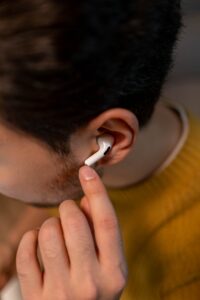The Most Common Causes of Hearing Loss

The most common causes of hearing loss
Workplace commotion
Hearing loss is the third most frequent ailment in the United States, trailing only arthritis and heart disease. One source of noise in the workplace, such as equipment, is one of the causes. Approximately 22 million Americans are exposed to hazardous noise levels at work. Motorcycles and power tools can potentially cause hearing impairment over time. Avoid loud activities and take frequent pauses. Wear earplugs or over-the-ear hearing protection.
Injuries or changes in pressure
A severe head injury can cause the middle ear bones to dislocate or injure the nerves, resulting in irreversible hearing loss. Sudden pressure changes caused by flying or diving might also harm your eardrum, middle or inner ear. Eardrums often heal in a few weeks. However, if your inner ear has been seriously damaged, surgery may be required. Never insert cotton swabs or other foreign things into your ears. This has the potential to rupture your eardrum and cause irreparable harm.

Medications
Some medications, such as antibiotics, cancer therapies, and erectile dysfunction meds, can cause hearing loss. While you are on these medications, your doctor will most likely monitor your hearing. Some hearing loss, however, may be permanent. Among the other medications that can cause temporary hearing loss are:
Aspirin and other nonsteroidal anti-inflammatory drugs (NSAIDs) such as ibuprofen.
Loop diuretics are commonly used to treat high blood pressure.
Antimalarial drugs such as quinine
Chronic illnesses
Hearing loss can be caused by long-term disorders that are not immediately related to your ears. In certain persons, blood flow to the inner ear or brain is disturbed. Among these disorders are:
Cardiovascular disease
Stroke
Blood pressure is too high.
Diabetes
Some types of hearing loss are also related to autoimmune disorders such as rheumatoid arthritis.
“Stroke” to the ear
A “stroke” (sudden sensorineural hearing loss) occurs when you suddenly or within a few days lose your hearing. In most cases, just one ear is impacted. The cause could be an injury, medication, or disease. However, doctors cannot identify a reason in 90% of cases. If this is the situation, you should seek medical attention right away. Hearing protection can be achieved by treatment.
Tumours and tumour-like growths
Noncancerous growths such as bone tumours, scar tissue, and cysts can obstruct the ear canal and result in hearing loss. Hearing can sometimes be recovered by eliminating the growth. Acoustic neuroma is a rare tumour that develops on the inner ear’s hearing and balance nerves. It can cause balance problems, facial deafness, and ringing in the ears, in addition to hearing loss. Sometimes treatment can save part of the hearing.
Sounds that are explosive
Explosions such as fireworks, gunshots, and other explosives produce intense sound waves that can rupture the eardrum or harm the inner ear. This can result in either temporary or permanent hearing loss. Hearing loss due to gunfire or explosives is, in fact, the most prevalent combat injury in the United States today. Wear hearing protection and remain as far away from the noise source as possible to safeguard your hearing.
Tinnitus, concerts, and loud noises
After a concert, do your ears ring? This is known as tinnitus. It isn’t the same as hearing loss, although there is a link. A rock concert’s average decibel level is 110 dB, enough to cause harm in less than 5 minutes. Any noise that exceeds 85 dB might be harmful to your hearing. Other potentially hazardous noises include leaf blowers and chainsaws. Tinnitus can continue for hours, weeks, or even for the rest of one’s life. Wear earplugs and minimise your loud exposure to avoid it.
Headphones and earplugs
Can people hear the music you’re listening to while wearing earplugs or headphones? The volume should be lowered if this is what is happening. The usage of these devices can result in temporary or permanent hearing loss. The bigger the risk, the louder the music and the longer you listen to it. Set the volume no higher than 60% of the maximum to ensure safe listening. Also, don’t listen to anything for more than an hour at a time.
Earwax formation
Earwax keeps dirt and bacteria out of your ear canal. It can, however, accumulate, harden, and impair your hearing. The most prevalent cause of curable hearing loss. Do you believe you have an earwax blockage? It’s a poor idea to try to remove it on your own. Inserting a swab or anything else into your ear canal is not safe. A doctor can do this procedure fast and securely.
Infections and diseases
Many typical childhoods and adolescent disorders can impair hearing. Ear infections can cause fluid to build up in the middle ear, resulting in temporary hearing loss. Other disorders can harm the middle or inner ear, resulting in irreversible hearing loss. Hearing loss can be caused by a variety of diseases, including:
Chickenpox
Encephalitis
Influenza
Measles
Meningitis
Mumps
Several of these diseases can be prevented by vaccination.
Birth hearing loss
Some children are born deaf or deafeningly deaf. This is referred to as congenital hearing loss. It is common in families. It can, however, occur if the mother has diabetes, high blood pressure, or an infection during her pregnancy. Premature birth or birth trauma can also result in hearing loss in a child. In neonates, jaundice can also cause hearing loss.
Age
Hearing deteriorates with ageing. Noise and sickness can both cause harm. However, it is also possible to protect your ears throughout your life. By the age of 75, over half of the population has lost some hearing. However, hearing aids, cochlear implants, and therapies are available to help you enhance your hearing. Consult an audiologist to determine what is best for you.





